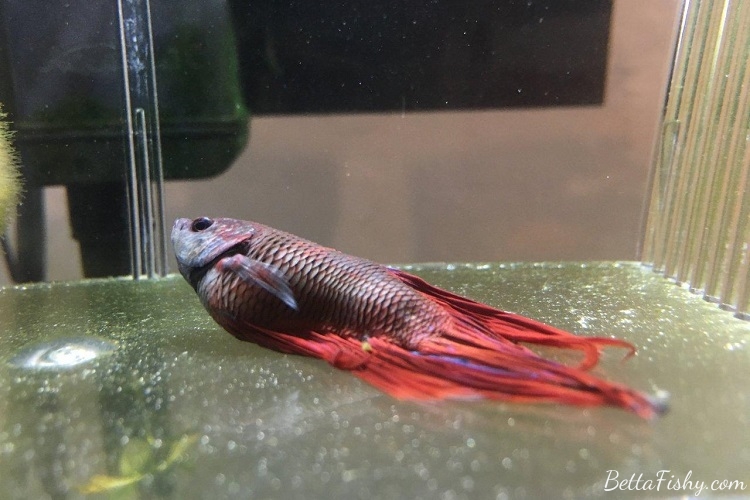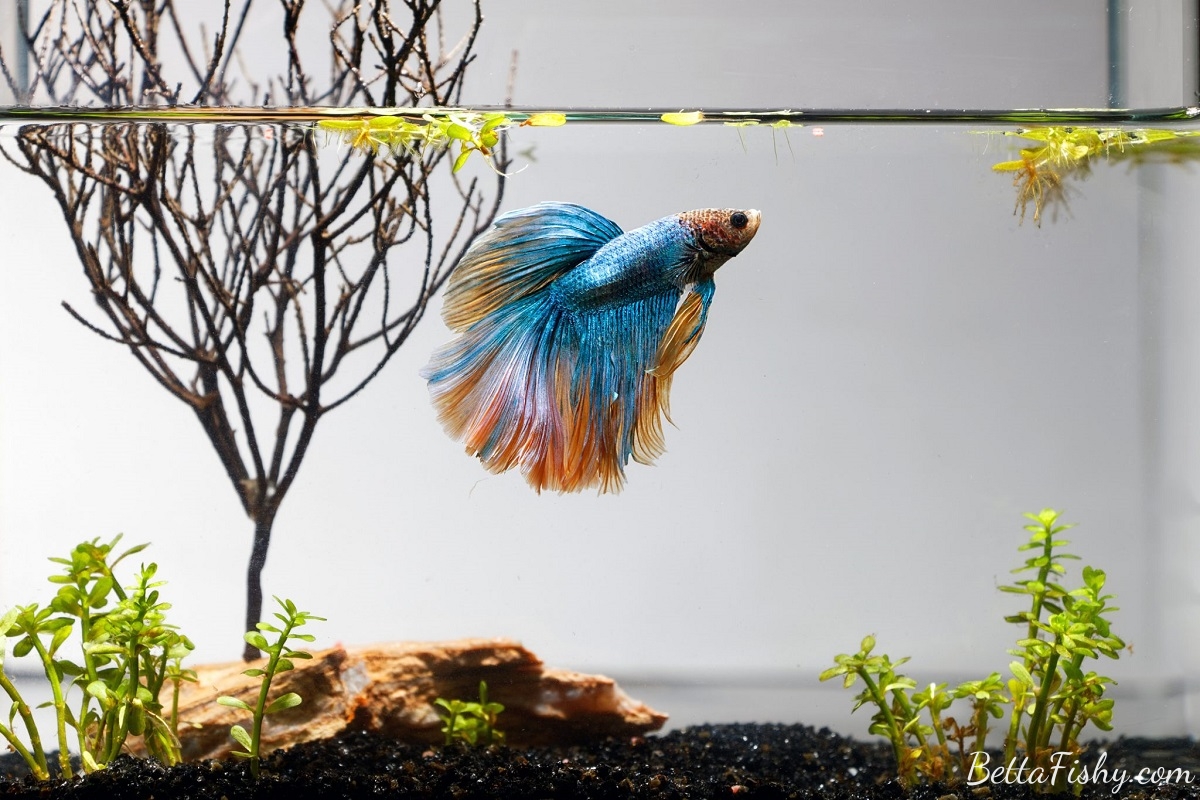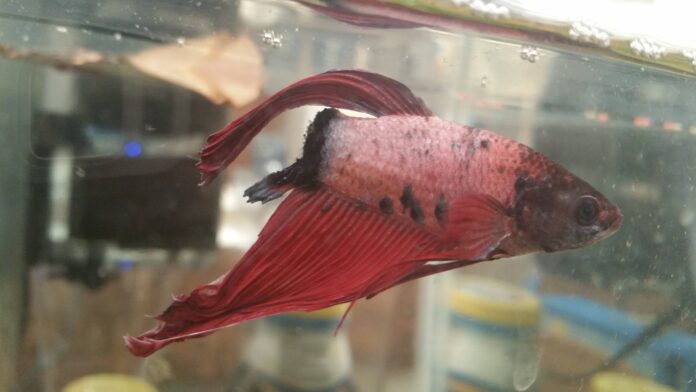Betta fish, also known as Siamese fighting fish, are popular pets due to their vibrant colors and unique personalities. However, like any other living creature, betta fish are susceptible to various diseases that can affect their health and well-being. One of the most common issues faced by betta fish owners is the appearance of black spots on their fish’s body or fins. These spots can be a sign of an underlying health problem and should not be ignored. In this article, we will discuss five tips to prevent black spots on betta fish and keep them healthy and happy.

Before we dive into the tips, it is essential to understand the causes and effects of black spots on betta fish. These spots can appear on the body, fins, or both and can vary in size and shape. They can be a result of various factors, including poor water quality, improper diet, stress, and even genetics. Black spots can also be a symptom of a more severe condition, such as fin rot or white spot disease.
If left untreated, black spots can lead to further health complications for your betta fish, such as infections and weakened immune system. Therefore, it is crucial to address the issue as soon as you notice it. Now, let’s move on to the tips that will help you prevent black spots on your betta fish.
Tip 1: Maintain Optimal Water Conditions for Your Betta Fish

The first and most crucial tip to prevent black spots on your betta fish is to maintain optimal water conditions in their tank. Betta fish are sensitive to changes in water parameters, and poor water quality can lead to various health problems, including the appearance of black spots. Here are some key factors to consider when it comes to water conditions for betta fish:
pH Level
The ideal pH level for betta fish is between 6.5 and 7.5. Any significant fluctuations in the pH level can stress out your fish and make them more susceptible to diseases. Regularly test the water in your betta fish tank and make sure to keep the pH level within the recommended range.
Temperature
Betta fish are tropical fish and require a consistent water temperature of around 78-82°F (25-28°C). Fluctuations in temperature can weaken their immune system and make them more prone to health issues, including black spots. Invest in a good quality heater and thermometer to maintain a stable temperature in your betta fish tank.
Filtration and Water Changes
Proper filtration is crucial for maintaining clean and healthy water for your betta fish. A good rule of thumb is to have a filter that can handle at least three times the volume of your tank. Additionally, regular water changes are essential to remove any build-up of toxins and waste products. Aim for a 25% water change every week to keep the water quality in check.
Tip 2: Provide a Balanced Diet to Keep Your Betta Fish Healthy

A well-balanced diet is vital for the overall health and immunity of your betta fish. Feeding your fish a varied diet will ensure they receive all the necessary nutrients to fight off diseases and stay healthy. Here are some key points to keep in mind when it comes to feeding your betta fish:
Quality over Quantity
It is essential to feed your betta fish high-quality food that is specifically formulated for them. Avoid overfeeding as it can lead to bloating and other digestive issues. A general rule is to feed your betta fish only what they can consume in two minutes, twice a day.
Variety is Key
Betta fish are carnivorous and require a diet rich in protein. However, it is essential to provide them with a variety of food sources, including pellets, frozen or live foods such as bloodworms, brine shrimp, and daphnia. This will not only keep your betta fish interested in their food but also ensure they receive all the necessary nutrients.
Avoid Overfeeding
Overfeeding can lead to excess waste in the tank, which can cause an imbalance in water parameters and lead to various health issues, including black spots. It is crucial to remove any uneaten food from the tank after feeding to maintain good water quality.
Tip 3: Quarantine New Additions to Prevent the Spread of Diseases

Introducing new fish or plants to your betta fish tank can introduce new diseases and parasites that can affect the health of your betta fish. Therefore, it is essential to quarantine any new additions before introducing them to the main tank. Here are some key points to keep in mind when quarantining new fish or plants:
Separate Tank
Set up a separate tank for quarantining new additions. This tank should have its own filtration system and be free from any decorations or substrate. This will make it easier to monitor the health of the new fish or plants and prevent any potential spread of diseases.
Observation Period
Keep the new additions in quarantine for at least two weeks. During this time, observe them closely for any signs of illness, including black spots. If you notice any symptoms, treat them accordingly before introducing them to the main tank.
Proper Cleaning and Disinfection
After the observation period, thoroughly clean and disinfect any equipment used in the quarantine tank before using it in the main tank. This will prevent any potential transfer of diseases to your betta fish.
Tip 4: Avoid Overcrowding in the Betta Fish Tank

Betta fish are territorial and do not do well in overcrowded tanks. Overcrowding can lead to stress, aggression, and the spread of diseases among your betta fish. Here are some key points to keep in mind when it comes to tank size and stocking levels for betta fish:
Tank Size
A common misconception is that betta fish can thrive in small bowls or containers. However, betta fish require a minimum tank size of 5 gallons (19 liters) to live comfortably. A larger tank will also provide more space for your betta fish to swim and explore, reducing their stress levels.
Stocking Levels
In addition to tank size, it is crucial to consider the stocking levels in your betta fish tank. As a general rule, one betta fish should be kept alone in a tank. If you wish to add other fish, make sure they are compatible with betta fish and do not exceed the recommended stocking levels for your tank size.
Monitor Behavior
Keep an eye on your betta fish’s behavior and look out for any signs of stress or aggression. If you notice any issues, consider removing or rearranging decorations in the tank to provide more hiding spots for your betta fish.
Tip 5: Use Appropriate Medication When Needed
Despite our best efforts, betta fish can still fall ill and develop black spots. In such cases, it is essential to use appropriate medication to treat the underlying cause and prevent the condition from worsening. Here are some key points to keep in mind when using medication for your betta fish:
Identify the Cause
Before administering any medication, it is crucial to identify the cause of the black spots. This can be done by observing your betta fish’s behavior and looking out for any other symptoms. Different causes may require different types of medication, so it is essential to get a proper diagnosis before treating your betta fish.
Follow Instructions Carefully
When using medication, it is crucial to follow the instructions carefully. Improper use of medication can do more harm than good and may even lead to the development of antibiotic-resistant bacteria in your tank.
Isolate Sick Fish
If you have multiple betta fish in a tank, it is essential to isolate the sick fish before treating them with medication. This will prevent the spread of diseases to other fish and allow for easier monitoring of the sick fish’s progress.
Conclusion: Implement These Tips to Keep Your Betta Fish Healthy and Free from Black Spots
In conclusion, black spots on betta fish can be a sign of an underlying health issue and should not be ignored. By following these five tips, you can prevent the appearance of black spots and keep your betta fish healthy and happy. Remember to maintain optimal water conditions, provide a balanced diet, quarantine new additions, avoid overcrowding, and use appropriate medication when needed. With proper care and attention, your betta fish can live a long and healthy life without any black spots or other fish diseases.


